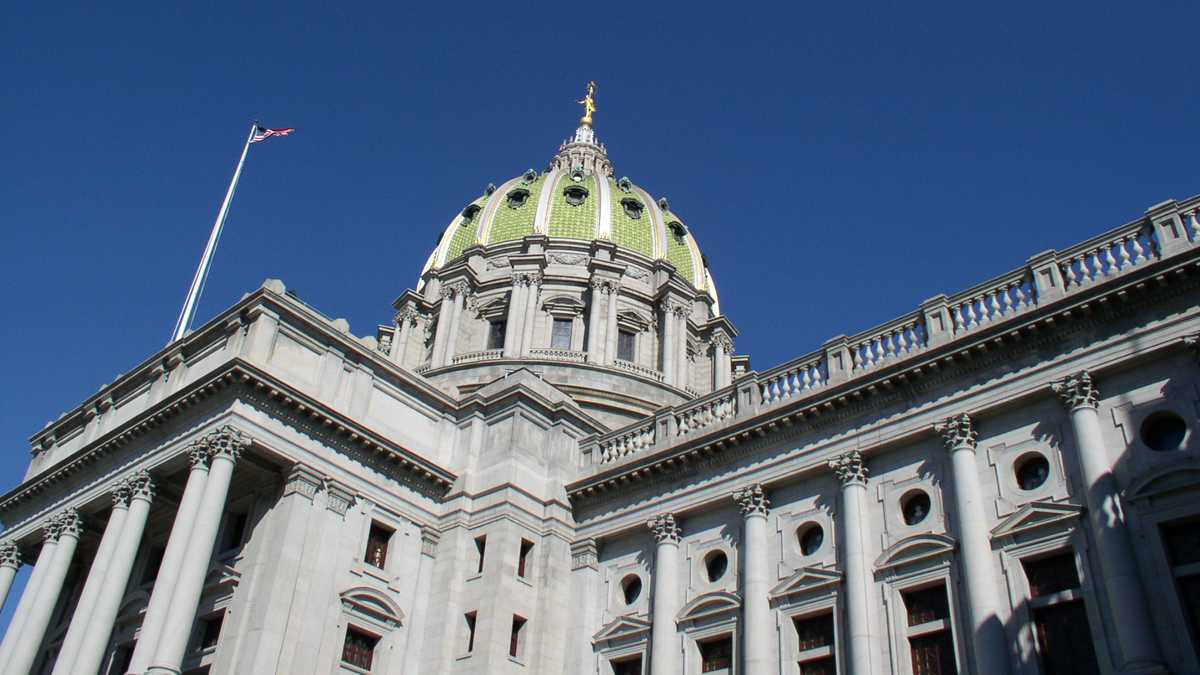Fact check: Gov. Corbett’s line-item veto and a billion-dollar debt deal

A Democratic state lawmaker claims that one of Republican Gov. Tom Corbett’s line-item vetoes in the state budget threatens a costly public debt settlement in the city of Harrisburg. That is not exactly accurate.
Corbett signed the spending plan last week, using a line-item veto to cut $65 million. That included a $5 million transfer from the state Department of General Services to the General Assembly, described as “for Harrisburg parking.” It refers to the Commonwealth’s 30-year contracts for employee parking that were key to a deal that resolved nearly $600 million of the capital city’s debt. At the time, some municipal restructuring experts and others hailed it as an innovative fix to what’s widely considered Pennsylvania’s worst local public debt crisis.
State Sen. Rob Teplitz, D-Dauphin, released a statement criticizing the governor for risking an arrangement – hinging on two main components, one of which is a lease of the garages – devised by his own administration.”It’s outrageous that the governor would put the city’s financial recovery plan — developed largely by his own appointed receiver — into jeopardy. This funding is a critical piece of the entire puzzle that was carefully assembled last year in order to move the city toward financial stability,” Teplitz wrote.
If the total of $5 million was meant for Harrisburg’s parking system, that risk would be imminent. But under the line item veto, the figure is more like $800,000, according to estimates provided by state officials and confirmed by financial documents and parking contracts.
The loss of that amount won’t have the same effect, confirms Jarad Handelman, the Corbett administration’s deputy general counsel who handled the Harrisburg negotiations.
One city councilman Ben Allatt says the reduction could have more of an impact, however, depending on how the garages perform otherwise.
He also says he doesn’t fully know what to make of the public exchange among state officials.
“It’s either something that’s going to truly be a loss that the city or Standard Parking will feel. Or it’s an internal problem between the legislature and DGS that they have to solve, and the city of Harrisburg is the crossfire of their mud-slinging,” Allatt says.
Teplitz says the same, later attributing the unnecessary confusion to infighting.
“We – the city of Harrisburg – shouldn’t have been dragged into a dispute between two branches of government over pensions,” he says.
State agencies have long paid for employee parking in Harrisburg’s garages.
Formalizing the long-standing practice into a 30-year contract, however, boosted the value of a three-decade lease of the garages in advance of a nearly $290 million debt issuance last December. The money helped pay off some of the city’s obligations. The municipality also sold its incinerator.
Long-term obligations for those borrowings total more than $1 billion.
If all other parking revenues come in as planned, the loss of the legislature’s share would mean $1.1 million to save for repairs and maintenance instead of $1.9 million as planned, projections show.
Taking away $5 million, as Teplitz initially said would occur as the result of the governor’s action, would be nearly a quarter of anticipated annual revenue the entire parking system.
Such a loss leave the Pennsylvania Economic Development Financing Authority, which has leased the garages, nearly $1 million short on repayments due this year. It also would mean Dauphin County, bond insurer Assured Guaranty Municipal or both parties likely would have to pay because they’ve guaranteed some of PEDFA’s bonds.
A $5 million shortfall also would cut out the share of parking system proceeds – which were $2 million this year – marked for the struggling city government, and risk another financial emergency, less than a year after the municipality starting paying its bills again.
Collectively, all state agencies’ parking payments will generate nearly $7 million this year, projections show.
It’s unclear whether the General Assembly will use some of its $153 million in surplus, or some other source, to pay its $800,000 share this year.
“(Five million) is at least quadruple that,” says Handelman, so the representation of the $5 million DGS transfer as entirely for parking is “a head-scratcher.”
Teplitz, Democrat appropriations staff, and Corbett’s spokesman Jay Pagni all say they got their information from Republican lawmakers.
Documents released after Corbett’s news conference last week state the money is for parking and “municipal relocation.”
The latter refers to moving offices and closing out and executing new leases as needed by redistricting, and that’s what most of the $5 million was for, according to Drew Crompton, chief of staff for Senate president Pro Tempore Joseph Scarnati, R-Jefferson.
Crompton also says lawmakers are paying $180 per space per month this year, which is higher than what’s stated in the DGS contract with PEDFA: $130 during the first half and $140 during the second half of the year.
That couldn’t be confirmed, and DGS Spokesman Troy Thompson says the General Assembly should have the same rate.
But if Crompton’s figure is correct, the legislature’s cost would be $1.2 million. That’s greater than $800,000, but not by enough to risk imminent default – at least not on its own.
It’s unclear whether the General Assembly will use some of its $153 million in surplus, or some other source, to pay.
WHYY is your source for fact-based, in-depth journalism and information. As a nonprofit organization, we rely on financial support from readers like you. Please give today.



